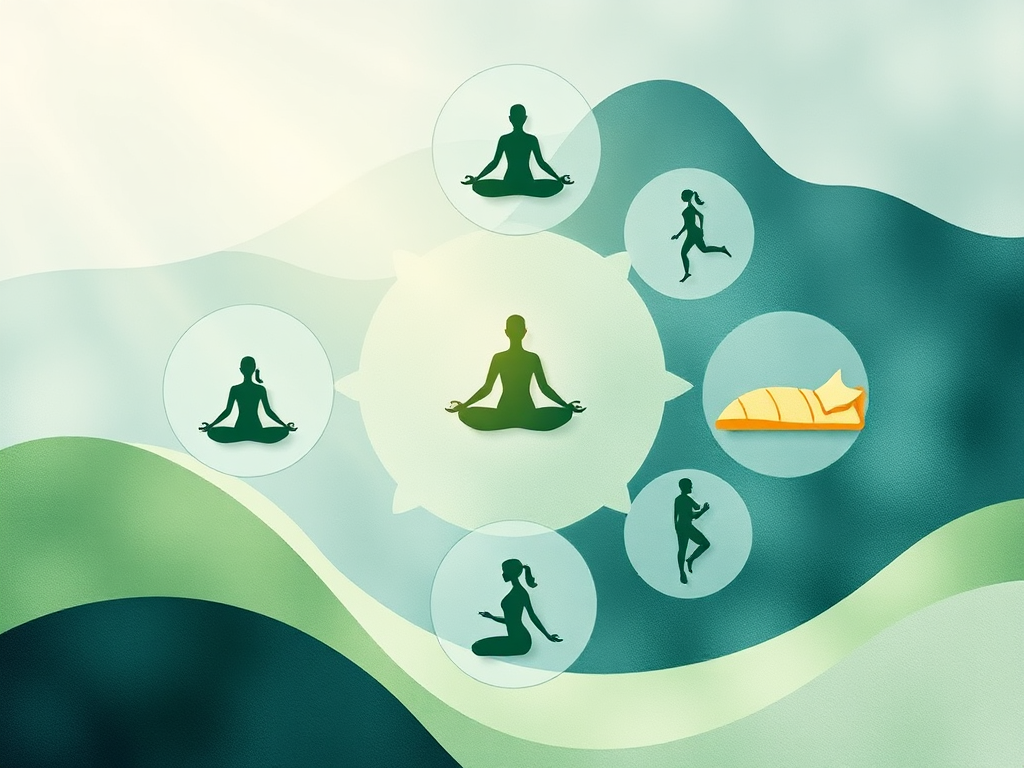Opening Words
Hey, dear friends. As a post-90s nutritionist, I'm often asked: "Why can't I lose weight? Why am I always exhausted? Why can't I sleep well?" Actually, these issues can often be traced back to one fundamental cause: our lifestyle is problematic. In my six years of nutrition consulting career, I've encountered various clients who generally have irregular lifestyles and unhealthy eating habits. Today, let me discuss how to create a healthy lifestyle from a professional perspective in the most down-to-earth way.
Dietary Revolution
I remember once, one of my clients, Xiao Wang, told me: "Sister nutritionist, I find healthy eating so difficult!" This reminded me of how I felt when I first started my career. Indeed, faced with overwhelming nutrition information, anyone would feel lost. However, the core of healthy eating is simply "balance."
Let's imagine our diet as a concert. Staple foods are the main melody, protein is the harmony, fruits and vegetables are the ornamental notes, and various vitamins and minerals are the transitions between notes. Only when these elements perfectly combine can they play a beautiful "health symphony."
In my clinical practice, I've found many people seriously misunderstand staple foods. Some completely eliminate staple foods to lose weight, resulting not only in failing to achieve the expected weight loss but also experiencing dizziness, poor concentration, and decreased immunity. In fact, carbohydrates are the body's main energy source, and should account for 50-65% of daily energy intake. Choosing quality carbohydrates mainly from whole grains not only provides sustained energy but also supplements dietary fiber, B vitamins, and other important nutrients.
Speaking of protein, it's like building blocks for a house, essential for building and repairing body tissues. Daily protein intake should be 1.0-1.5 grams per kilogram of body weight. Quality protein sources include lean meat, fish, eggs, dairy products, and soy products. I often advise clients to include protein in every meal, which can increase satiety and avoid overeating.
Vegetables and fruits are important sources of vitamins, minerals, and phytochemicals. It's recommended to consume 300-500 grams of vegetables and 200-350 grams of fruit daily. When choosing, pay attention to color diversity, as different colored produce contains different nutrients. For example, dark green broccoli is rich in folic acid, red tomatoes are rich in lycopene, and orange carrots are high in carotene.
Oil selection is also important. Many people consider oil a health enemy, but that's not true. Appropriate amounts of quality oils are very important for maintaining body functions. It's recommended to choose plant oils rich in unsaturated fatty acids like olive oil and flaxseed oil, with daily consumption controlled at around 25-30 grams.
Nutrition Decoded
Did you know? According to the latest statistics from the Chinese Nutrition Society, Chinese residents' whole grain intake is only one-third of the recommended amount. In my clinical practice, 90% of clients have vitamin D deficiency. These data tell us that even in today's material abundance, nutritional imbalance remains a common problem.
This situation has multiple causes. First, modern people's dietary structure has changed significantly, with a sharp increase in refined food intake. For example, many people are used to eating refined rice and flour, unaware that the refining process removes large amounts of vitamins, minerals, and dietary fiber.
Second, with accelerated life rhythms, many people choose takeout or fast food for meals, which are often high in salt, sugar, and fat, but relatively low in nutritional value. One of my clients, Xiao Li, gained excess weight and elevated blood lipids due to long-term reliance on takeout. After three months of dietary adjustment, he not only lost 15 pounds but also restored all body indicators to normal.
Third are nutrition knowledge misconceptions. For example, some people think taking vitamin pills equals getting all nutrients, which isn't true. Vitamin supplements can indeed supplement in certain situations, but the best nutrition source is natural food. Nutrients in food work synergistically; relying solely on supplements may cause nutritional imbalance.
Another important issue is the intergenerational transmission of dietary habits. Many poor eating habits are formed in childhood, such as picky eating and irregular meal times. If these habits aren't corrected timely, they will have long-term health impacts. I met a client who never liked eating breakfast since childhood, leading to stomach problems in adolescence, only realizing the seriousness after starting work.
Action Guide
At this point, you might ask: "So what should I do?" Don't worry, let me share a "321 Nutrition Rule":
3: Three regular meals daily, don't skip meals for weight loss. Statistics show that people who eat regularly generally have ideal body mass indexes and more energy. Breakfast should be within an hour of waking, lunch preferably around noon, and dinner before 7 PM. Keep 4-5 hours between meals to let the digestive system rest adequately.
It's particularly important to note that many people skip breakfast or dinner to control weight, which is very inadvisable. Research shows that regular three meals can stabilize blood sugar levels and avoid overeating. Moreover, breakfast quality directly affects daily energy levels. Breakfast should include staples, quality protein, and fresh produce, such as whole wheat bread with boiled eggs and milk, plus a fruit - this is a good combination.
2: Prepare two water containers. One for the office, one to carry. Research shows 75% of people have varying degrees of dehydration, while adequate water intake can increase metabolism efficiency by about 30%. Body water needs come not only from drinking water but also tea, soup, etc. Total daily water intake should be around 1500-2000ml.
Note that water supplementation has its principles. It's best to drink small amounts frequently, about 200-300ml each time. Drinking warm water after waking helps wake up the digestive system; drinking water half an hour before meals increases satiety; timely water supplementation during exercise prevents dehydration. However, avoid drinking large amounts of water 1-2 hours before sleep to prevent affecting sleep quality.
1: Set yourself a small goal. For example, start eating whole grains for breakfast tomorrow. Data shows people who consistently eat whole grains have 40% lower cardiovascular disease rates than the general population. When choosing whole grain products, check the ingredients list - true whole grain products should list whole grains first.
Besides whole grains, you can set other small goals, like eating a pound of vegetables daily, eating fish three times weekly, or drinking a glass of pure milk daily. These small goals seem simple, but persistence brings significant health improvements.
When implementing these suggestions, proceed gradually, don't rush. My experience is that any dietary habit change needs an adaptation period, generally about 21 days. During this period, you may encounter various difficulties and challenges, but if you persist, new habits will gradually form.
Exercise Strategy
After discussing eating, let's talk about movement. Many people ask me: "What if I don't have time to exercise?" This question reminds me of my early working days. Later I discovered exercise can be "fragmented."
According to Sports Administration data, accumulating 30 minutes of exercise throughout the day is as effective as exercising for 30 minutes at once. So you can use work time, walking 5 minutes every hour, meeting the target by day's end. Besides walking, you can do simple stretching exercises like neck rotations, shoulder stretches, toe raises, etc., all doable in the office.
Regarding exercise intensity, many people misunderstand, thinking exercise must make you sweat profusely to be effective. Actually, moderate-intensity exercise is often more suitable for most people. The standard for appropriate exercise intensity is: being able to talk normally during exercise but unable to sing. If talking is difficult, the intensity is too high; if you can sing easily, the intensity is insufficient.
Exercise methods should also be chosen based on individual circumstances. For office workers who sit long hours, stretching exercises like yoga or Pilates are recommended, which can improve posture and relieve muscle fatigue. For those wanting to enhance cardiopulmonary function, choose aerobic exercises like fast walking, jogging, or swimming. For middle-aged and elderly people, low-intensity exercises like Tai Chi or square dancing are more suitable.
It's particularly important to note that warm-up before exercise and stretching afterward are both important. Warm-up can increase muscle temperature and elasticity, reducing injury risk; stretching helps muscles relax, promotes lactic acid metabolism, and reduces next-day soreness.
The Way of Sleep
Finally, let's discuss sleep. According to the Chinese Sleep Research Society report, over 38% of Chinese people have sleep problems. In my consulting experience, many insomnia roots come from incorrect lifestyle habits.
Why is sleep so important? Because it directly affects our metabolism and endocrine system. Research finds sleep deprivation leads to appetite regulation hormone secretion disorders, making people more likely to feel hungry, thereby increasing overeating risk. Additionally, poor sleep quality affects next-day work efficiency and emotional state.
To improve sleep quality, first establish regular sleep schedules. It's best to go to bed and wake up at fixed times daily, maintaining this even on weekends. Second is creating a good sleep environment, including appropriate temperature (18-22°C), relatively quiet environment, comfortable bedding, etc.
Pre-sleep activities are also crucial. Avoid intense exercise 1-2 hours before sleep and using electronic devices, as blue light suppresses melatonin secretion. Do relaxing activities like listening to light music, taking a warm bath, or doing simple stretches.
Regarding diet, avoid large meals 4 hours before sleep; if hungry, drink warm milk or eat a small handful of nuts. Avoid stimulating beverages like coffee, tea, and alcohol.
If you can't sleep after lying in bed for over 20 minutes, get up and do some relaxing activities in another room until feeling sleepy, then return to bed. This prevents associating the bed with insomnia, forming psychological suggestions.
Stress Management
Here, we must mention modern people's biggest health killer: stress. Research shows long-term high stress leads to increased cortisol secretion, affecting metabolism and causing weight gain.
The first step in stress management is learning to recognize stress signals. When we feel anxious, irritable, have insomnia, or changes in appetite, it's often stress at work. Adjust timely, don't let stress accumulate to health-affecting levels.
There are many stress relief methods, like deep breathing exercises, meditation, exercise. I often recommend clients try the "478 breathing method": inhale for 4 seconds, hold for 7 seconds, exhale for 8 seconds, practice 3-4 times daily, effectively relieving anxiety.
Appropriate exercise is also a good stress release method. Exercise secretes endorphins, known as "happiness hormones," improving mood. But note exercise intensity should be moderate, as excessive exercise increases body burden.
Additionally, developing hobbies, maintaining social activities, seeking professional help when needed are all effective stress management methods. Most importantly, learn to "reduce burden," don't pursue perfection in everything, learn appropriate relaxation.
Closing Thoughts
Healthy living is both difficult and simple. The key is starting with small things, progressing gradually. As I often tell clients: health isn't a destination but a journey. On this journey, every small change is important.
Remember, every choice you make shapes your future self. If this article helps you, try implementing some small suggestions mentioned starting tomorrow. Let's together begin a new chapter of healthy living.
Actually, healthy living doesn't mean being overly strict with yourself. Occasional indulgence and enjoyment are life's seasonings. The key is moderation, finding balance between relaxation and self-discipline. As I often say: it's not about completely giving up snacks, but learning to choose healthier ones; not about going to the gym every day, but integrating exercise into daily life.
Finally, I want to say change needs time and patience. Don't give up because of temporary failure, nor get discouraged from not seeing immediate results. A healthy lifestyle is like a rolling snowball, perhaps slow at start, but effects gradually show with persistence.
Interactive Time
Do you have any health living concerns? Welcome to share in the comments, maybe I can give you some professional advice.
I believe everyone looks forward to a healthier, more energetic life. Let's work together, using scientific methods and correct attitudes to pursue better life quality. Looking forward to seeing everyone's changes and progress!
Related articles




